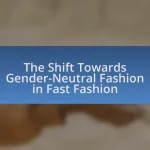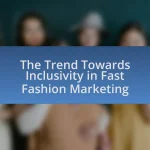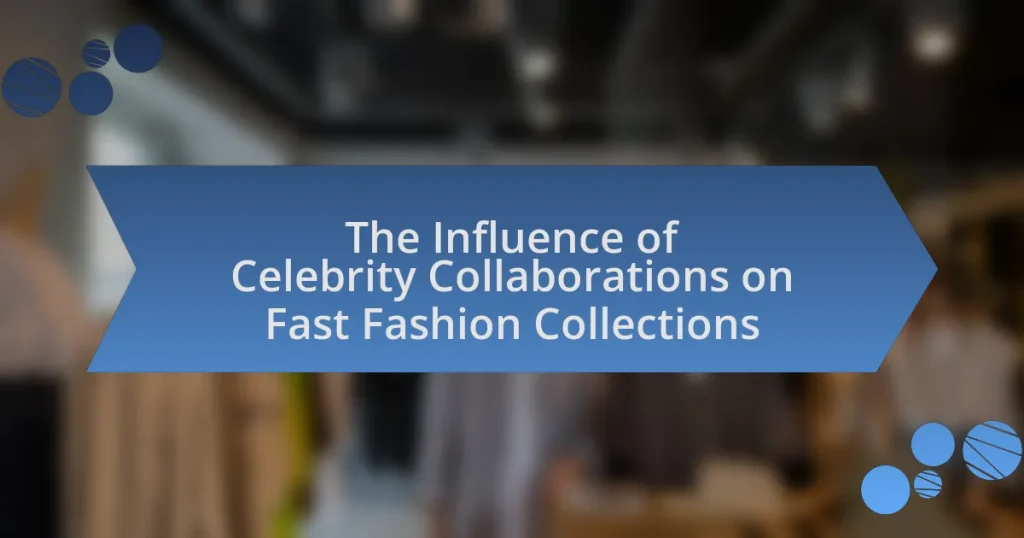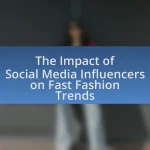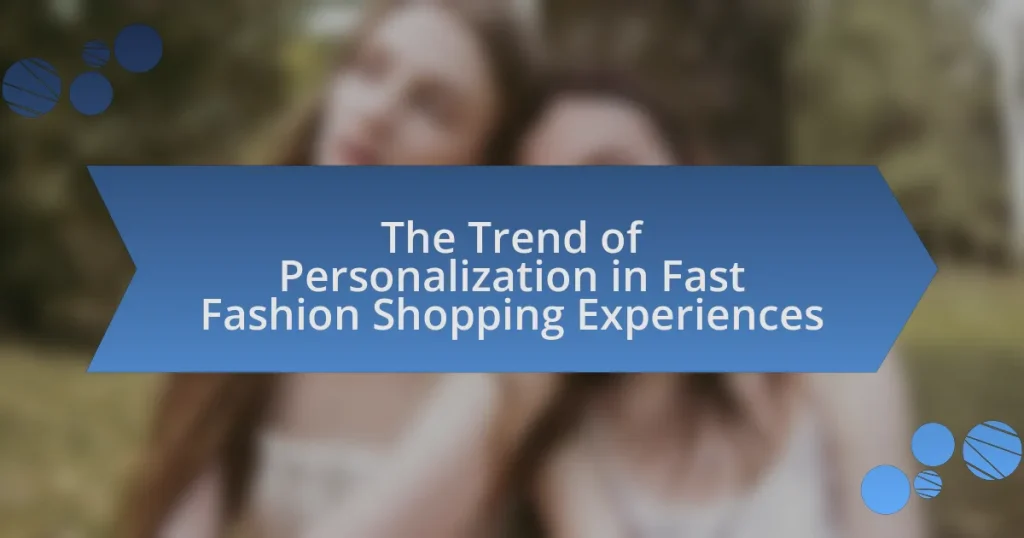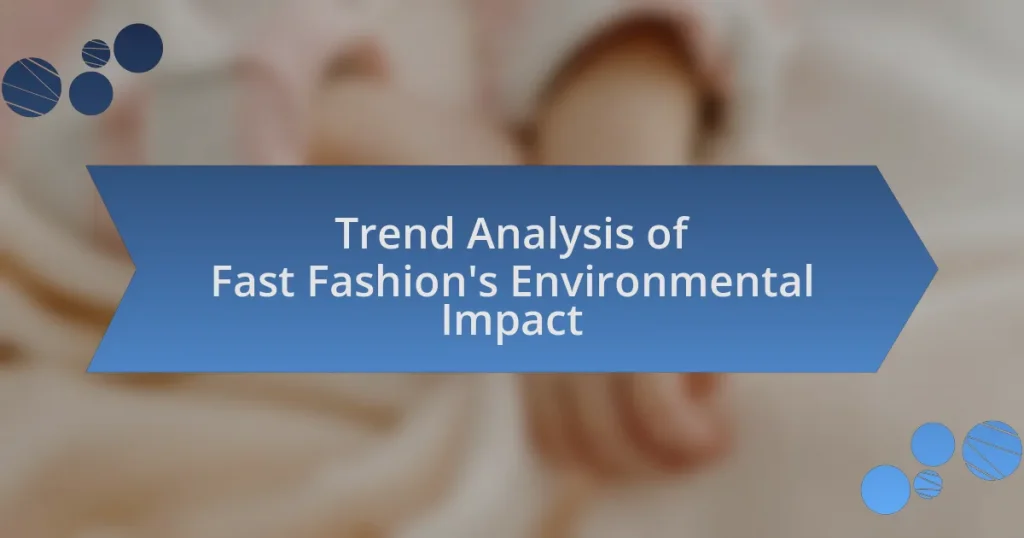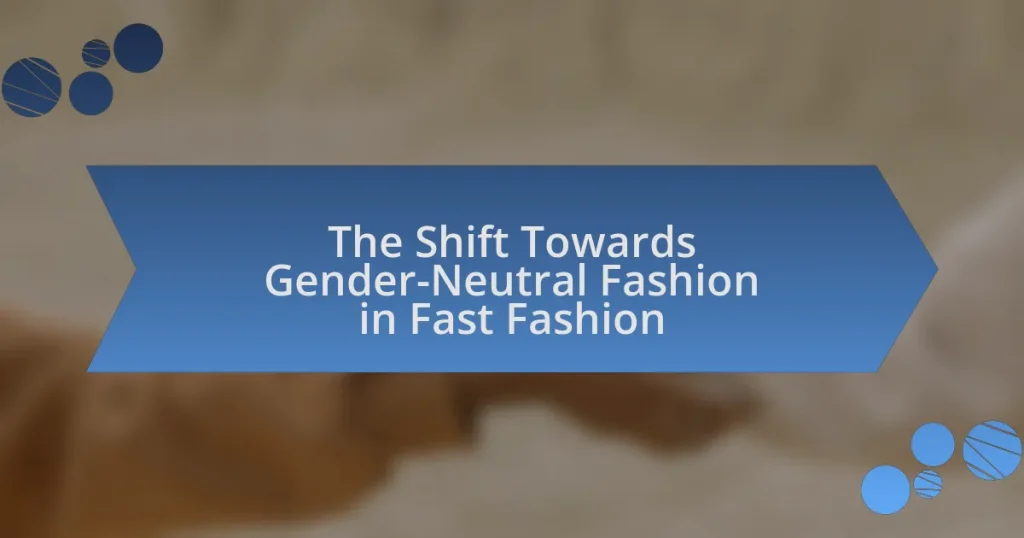The article examines the significant influence of celebrity collaborations on fast fashion collections, highlighting how these partnerships enhance brand visibility and consumer desirability. It discusses the psychological factors driving consumer attraction to celebrity-endorsed products, the role of social media in amplifying these collaborations, and the impact on consumer behavior and purchasing intentions. Additionally, the article addresses the potential drawbacks of such collaborations, including ethical concerns and market saturation, while also exploring best practices for brands to ensure alignment with celebrity values and enhance collaboration effectiveness. Overall, the article provides a comprehensive analysis of the dynamics between celebrity endorsements and the fast fashion industry.
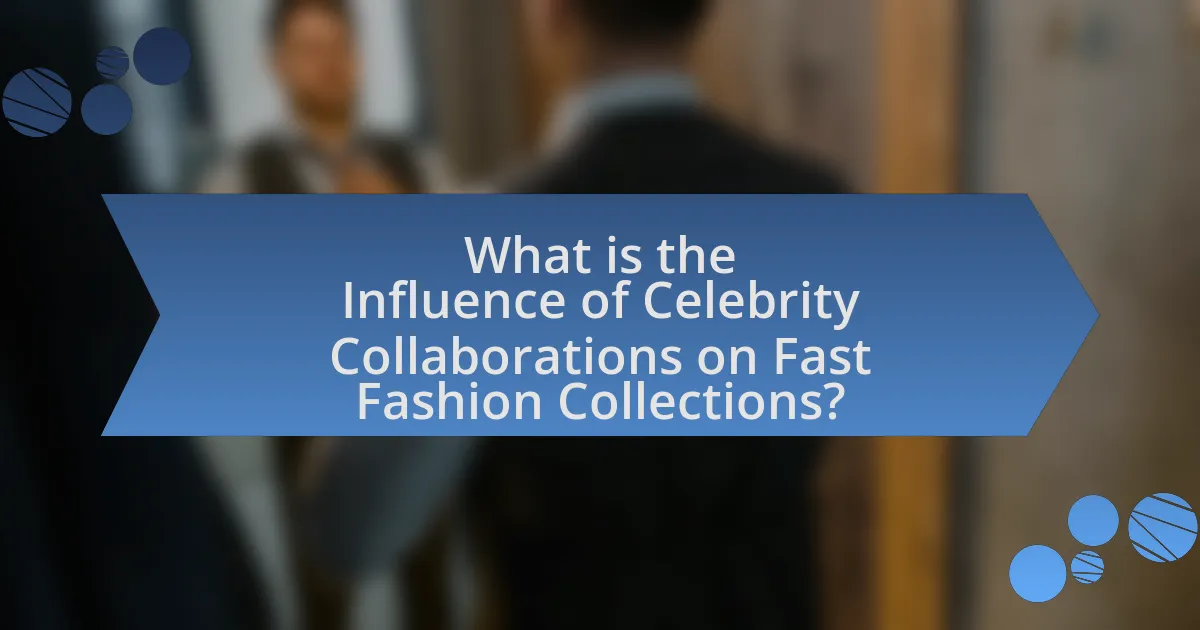
What is the Influence of Celebrity Collaborations on Fast Fashion Collections?
Celebrity collaborations significantly enhance the visibility and desirability of fast fashion collections. These partnerships leverage the celebrity’s influence to attract consumers, often resulting in increased sales and brand engagement. For instance, collaborations between brands like H&M and celebrities such as Beyoncé or Rihanna have led to sell-out collections, demonstrating the power of celebrity endorsement in driving consumer interest and urgency. Research indicates that 70% of consumers are more likely to purchase a product endorsed by a celebrity they admire, highlighting the effectiveness of these collaborations in shaping consumer behavior and trends in the fast fashion industry.
How do celebrity collaborations impact consumer behavior in fast fashion?
Celebrity collaborations significantly influence consumer behavior in fast fashion by enhancing brand visibility and desirability. When well-known figures partner with fast fashion brands, they attract their fan base, leading to increased consumer interest and purchase intent. For instance, a study published in the Journal of Fashion Marketing and Management found that celebrity endorsements can elevate brand perception and drive impulse buying, particularly among younger demographics. This effect is further amplified by social media, where celebrities showcase their collaborations, creating a sense of urgency and exclusivity that compels consumers to act quickly.
What psychological factors drive consumer attraction to celebrity-endorsed collections?
Consumer attraction to celebrity-endorsed collections is primarily driven by factors such as social proof, aspirational identification, and perceived value. Social proof occurs when consumers observe others, particularly peers or influencers, endorsing a product, leading them to believe that the product is desirable and worth purchasing. Aspirational identification happens when consumers relate to or aspire to the lifestyle of the celebrity, motivating them to buy products associated with that celebrity to feel a connection to that lifestyle. Perceived value is enhanced by the celebrity’s status, as consumers often associate higher quality and exclusivity with products endorsed by well-known figures. Research indicates that celebrity endorsements can increase brand recognition and consumer trust, as seen in a study published in the Journal of Advertising Research, which found that 71% of consumers are more likely to purchase a product when it is endorsed by a celebrity they admire.
How do social media platforms amplify the influence of celebrity collaborations?
Social media platforms amplify the influence of celebrity collaborations by providing a vast and immediate reach to diverse audiences. These platforms enable celebrities to share their collaborations with millions of followers instantly, creating a buzz that traditional media cannot match. For instance, a study by the Pew Research Center found that 72% of the public uses some form of social media, allowing celebrity endorsements to penetrate various demographics effectively. Additionally, the interactive nature of social media encourages user engagement through likes, shares, and comments, further enhancing visibility and credibility. This engagement can lead to viral trends, as seen with collaborations like Rihanna’s Fenty Beauty, which gained significant traction through social media promotion, resulting in rapid sales growth and brand loyalty.
What role do celebrities play in shaping fast fashion trends?
Celebrities play a significant role in shaping fast fashion trends by leveraging their influence to promote specific styles and brands. Their visibility in media and social platforms creates immediate demand for the clothing they wear, often leading to rapid production and distribution by fast fashion retailers. For instance, when celebrities like Kim Kardashian or Rihanna showcase outfits, it can result in a surge of interest, prompting brands to quickly replicate those styles to meet consumer demand. This phenomenon is supported by research from the Journal of Fashion Marketing and Management, which highlights that celebrity endorsements can increase brand awareness and consumer purchasing intentions significantly.
How do celebrities select designs and styles for their collaborations?
Celebrities select designs and styles for their collaborations by considering personal aesthetics, market trends, and brand alignment. They often collaborate with designers and brands that resonate with their image and values, ensuring that the final product reflects their unique style while appealing to their audience. For instance, Rihanna’s collaboration with Puma resulted in the Fenty line, which combined her personal fashion sense with contemporary streetwear trends, leading to significant commercial success. This approach is supported by the fact that collaborations often leverage the celebrity’s influence to drive consumer interest and sales, as seen in the partnerships between celebrities and fast fashion brands like H&M and Zara.
What is the impact of celebrity status on the perceived value of fast fashion items?
Celebrity status significantly elevates the perceived value of fast fashion items. When celebrities endorse or collaborate with fast fashion brands, their influence can create a sense of exclusivity and desirability around the products. For instance, a study published in the Journal of Fashion Marketing and Management found that celebrity endorsements can increase consumer purchase intentions by up to 37%. This heightened interest often leads to increased sales and brand loyalty, as consumers associate the items with the celebrity’s status and lifestyle. Consequently, fast fashion brands leverage celebrity collaborations to enhance their market appeal and justify higher price points, ultimately shaping consumer perceptions of value.
Why are celebrity collaborations a popular strategy for fast fashion brands?
Celebrity collaborations are a popular strategy for fast fashion brands because they leverage the influence and reach of celebrities to attract consumers and drive sales. These partnerships create a sense of exclusivity and urgency, as fans are eager to purchase items associated with their favorite stars. For instance, collaborations like H&M with Beyoncé or Zara with various influencers have resulted in significant spikes in brand visibility and consumer engagement. According to a study by the Journal of Fashion Marketing and Management, celebrity endorsements can increase purchase intentions by up to 20%, demonstrating the effectiveness of this strategy in enhancing brand appeal and market performance.
What advantages do brands gain from partnering with celebrities?
Brands gain significant advantages from partnering with celebrities, primarily through enhanced visibility and credibility. Collaborating with well-known figures allows brands to tap into the celebrity’s established fan base, which can lead to increased brand awareness and customer engagement. For instance, a study by the Journal of Advertising Research found that celebrity endorsements can increase purchase intent by up to 37%. Additionally, celebrities often embody specific lifestyles or values that resonate with target audiences, allowing brands to align themselves with those attributes and enhance their brand image. This strategic alignment can lead to higher sales and improved market positioning, as evidenced by the success of brands like Adidas and Puma, which have seen substantial growth following partnerships with celebrities such as Kanye West and Rihanna.
How do these collaborations affect brand image and market positioning?
Collaborations between celebrities and fast fashion brands significantly enhance brand image and market positioning by leveraging the celebrity’s influence and reach. These partnerships often result in increased visibility and desirability for the brand, as celebrities typically attract a dedicated fan base that is eager to emulate their style. For instance, when a well-known celebrity collaborates with a fast fashion label, the brand can experience a surge in sales and social media engagement, as seen with the collaboration between Beyoncé and Adidas, which revitalized the brand’s image and positioned it as a trendsetter in the athletic wear market. This strategic alignment not only elevates the brand’s status but also allows it to tap into new consumer demographics, thereby expanding its market share.
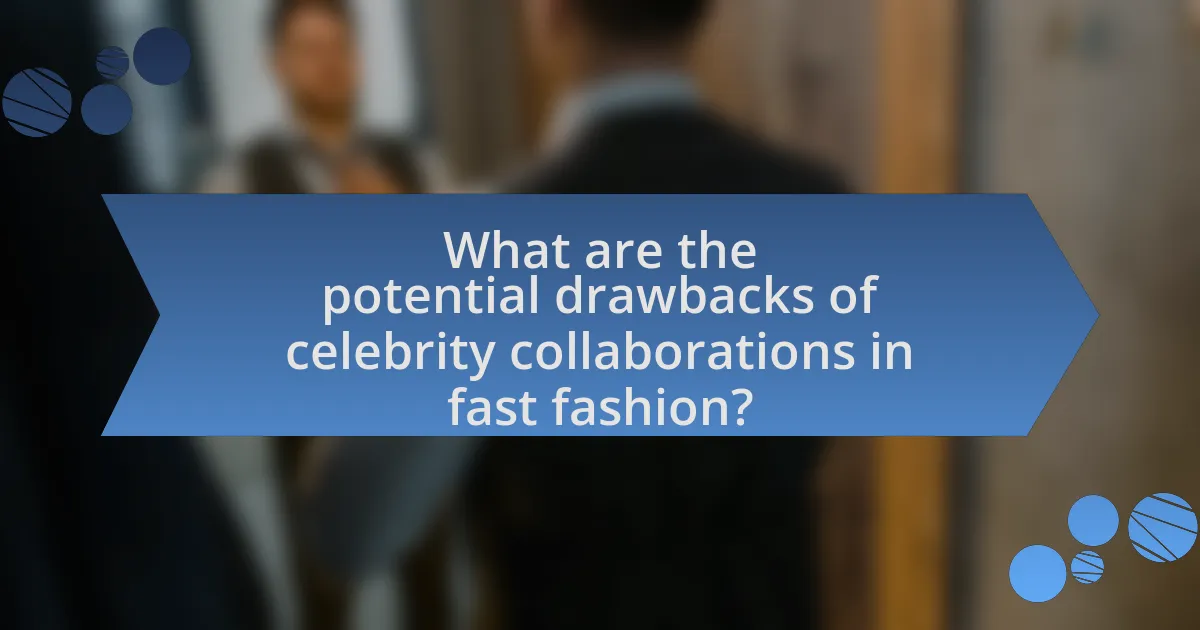
What are the potential drawbacks of celebrity collaborations in fast fashion?
Celebrity collaborations in fast fashion can lead to several potential drawbacks, including environmental concerns, ethical issues, and market saturation. The fast fashion industry is already criticized for its significant environmental impact, and celebrity collaborations often exacerbate this by promoting overconsumption and waste. For instance, a report from the Ellen MacArthur Foundation highlights that the fashion industry contributes to 10% of global carbon emissions, and collaborations can encourage rapid production cycles that further harm the environment.
Additionally, ethical concerns arise from the labor practices associated with fast fashion production, where low wages and poor working conditions are prevalent. Collaborations may not address these issues, leading to consumer backlash and reputational damage for both the celebrity and the brand. Furthermore, market saturation can occur when numerous celebrity collaborations flood the market, diluting brand identity and consumer interest. This phenomenon is supported by data from the Business of Fashion, which indicates that excessive collaborations can lead to diminishing returns for brands as consumers become desensitized to celebrity endorsements.
How can celebrity collaborations lead to consumer backlash?
Celebrity collaborations can lead to consumer backlash when the partnership is perceived as inauthentic or misaligned with the brand’s values. For instance, if a celebrity known for luxury endorses a fast fashion brand, consumers may view this as a betrayal of ethical standards, particularly regarding sustainability and labor practices. A notable example is the backlash faced by H&M when they collaborated with celebrities like Beyoncé, as critics argued that the brand’s fast fashion model contradicted the values of empowerment and sustainability that the celebrity represented. This disconnect can result in negative consumer sentiment, decreased brand loyalty, and public criticism, ultimately harming the brand’s reputation and sales.
What controversies have arisen from specific celebrity collaborations?
Controversies have arisen from celebrity collaborations in fast fashion, particularly regarding ethical concerns and cultural appropriation. For instance, the collaboration between H&M and rapper Travis Scott faced backlash due to allegations of insensitivity following the Astroworld tragedy, where multiple attendees lost their lives. Additionally, the partnership between Gucci and Dapper Dan sparked debate over cultural appropriation, as Dapper Dan’s designs were initially inspired by luxury brands, leading to accusations of exploitation of Black culture. These instances highlight the complex dynamics and potential repercussions of celebrity collaborations in the fast fashion industry.
How do ethical concerns impact consumer perceptions of celebrity-endorsed collections?
Ethical concerns significantly influence consumer perceptions of celebrity-endorsed collections by shaping their trust and loyalty towards the brand. When consumers perceive that a celebrity endorsing a collection is associated with unethical practices, such as labor exploitation or environmental harm, their likelihood of purchasing the collection decreases. Research indicates that 66% of consumers are willing to pay more for sustainable brands, highlighting the importance of ethical considerations in purchasing decisions. Furthermore, a study published in the Journal of Business Research found that consumers are more likely to support brands that align with their personal values, including ethical sourcing and corporate social responsibility. Thus, ethical concerns directly impact consumer attitudes and behaviors towards celebrity-endorsed collections.
What challenges do fast fashion brands face when collaborating with celebrities?
Fast fashion brands face several challenges when collaborating with celebrities, primarily related to brand alignment, public perception, and logistical issues. Brand alignment is crucial; if a celebrity’s image or values do not resonate with the brand’s target audience, the collaboration may fail to attract consumers. Public perception can also be a challenge, as consumers increasingly scrutinize the ethical implications of fast fashion, leading to backlash if a celebrity is perceived as endorsing unsustainable practices. Logistically, coordinating timelines and creative visions between the fast fashion brand and the celebrity can lead to delays and miscommunication, impacting the overall success of the collaboration. These challenges highlight the complexities involved in merging celebrity influence with fast fashion marketing strategies.
How do logistical issues affect the success of celebrity collaborations?
Logistical issues significantly hinder the success of celebrity collaborations by creating barriers in communication, production timelines, and distribution channels. When celebrities collaborate with brands, any misalignment in scheduling can lead to delays in product launches, which diminishes market impact and consumer interest. For instance, if a celebrity’s availability does not align with the brand’s production schedule, the collaboration may miss key retail seasons, resulting in lost sales opportunities. Additionally, logistical challenges such as shipping delays or inventory mismanagement can lead to stock shortages or overstock situations, further complicating the collaboration’s effectiveness. A study by the Fashion Institute of Technology found that 70% of failed collaborations cited logistical issues as a primary factor, underscoring the critical role that efficient logistics play in the overall success of these partnerships.
What are the risks of overexposure in celebrity partnerships?
Overexposure in celebrity partnerships can lead to brand dilution and consumer fatigue. When a celebrity is excessively featured in marketing campaigns, the uniqueness and desirability of the collaboration may diminish, causing consumers to lose interest. For instance, a study by the Journal of Marketing Research found that repeated exposure to the same celebrity endorsement can result in decreased effectiveness, as consumers may perceive the brand as less authentic or innovative. Additionally, overexposure can lead to negative public perception, where the celebrity’s image may become associated with over-commercialization, further impacting the brand’s reputation and sales.
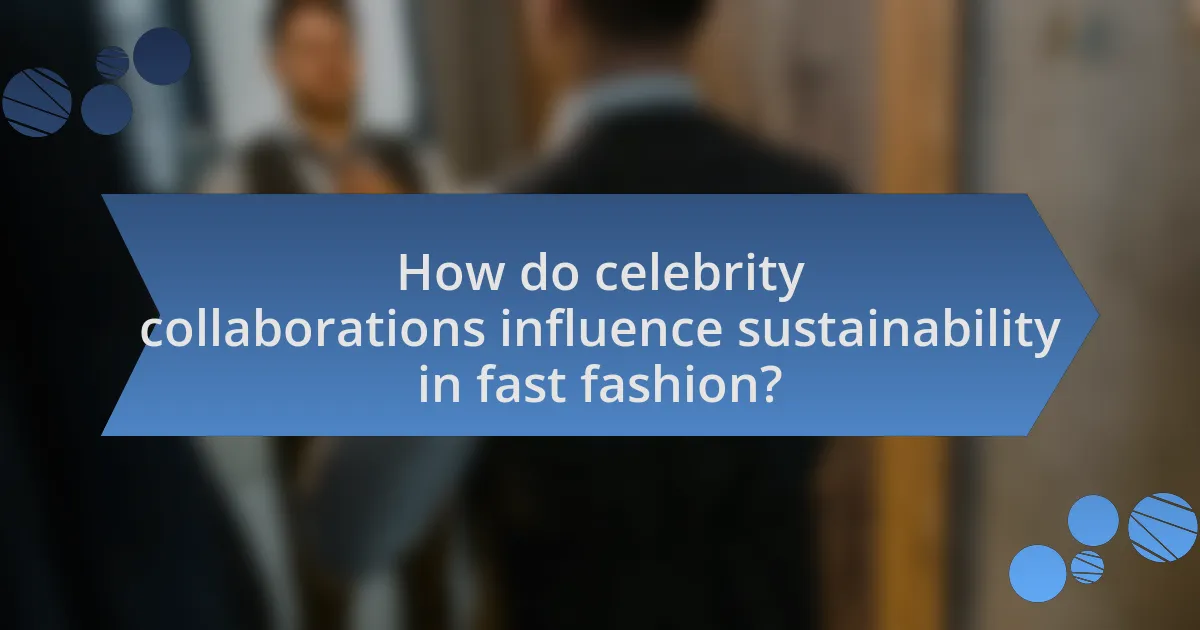
How do celebrity collaborations influence sustainability in fast fashion?
Celebrity collaborations significantly influence sustainability in fast fashion by leveraging their platforms to promote eco-friendly practices and raise awareness about sustainable fashion. These collaborations often result in limited-edition collections that emphasize the use of sustainable materials and ethical production methods, appealing to environmentally conscious consumers. For instance, brands like H&M have partnered with celebrities such as Beyoncé and Stella McCartney to launch collections that highlight sustainable practices, showcasing recycled materials and responsible sourcing. This not only enhances the visibility of sustainable fashion but also encourages consumers to make more informed purchasing decisions, thereby driving demand for sustainable options in the fast fashion industry.
What initiatives are celebrities taking to promote sustainable practices in fast fashion?
Celebrities are promoting sustainable practices in fast fashion through initiatives such as launching eco-friendly clothing lines, advocating for sustainable brands, and participating in awareness campaigns. For instance, Emma Watson has collaborated with brands like People Tree to create sustainable collections, emphasizing ethical production methods. Additionally, celebrities like Stella McCartney have built their entire fashion brands around sustainability, using organic materials and promoting circular fashion. These actions not only raise awareness but also influence consumer behavior towards more sustainable choices in the fashion industry.
How do consumer expectations shift towards sustainability with celebrity involvement?
Consumer expectations shift towards sustainability significantly with celebrity involvement, as celebrities often serve as influential role models who can drive public interest in eco-friendly practices. When celebrities endorse sustainable brands or initiatives, they enhance visibility and credibility, leading consumers to expect more environmentally responsible practices from brands they support. For instance, a study published in the Journal of Business Research found that celebrity endorsements can increase consumer willingness to pay for sustainable products by up to 20%. This indicates that consumers not only expect sustainability but are also willing to invest in it when celebrities advocate for it.
What are the implications of celebrity collaborations on sustainable fashion trends?
Celebrity collaborations significantly enhance the visibility and acceptance of sustainable fashion trends. These partnerships often leverage the celebrity’s influence to promote eco-friendly practices and sustainable materials, thereby reaching a broader audience. For instance, when celebrities like Emma Watson advocate for sustainable brands, they not only raise awareness but also encourage consumer demand for environmentally responsible products. Research indicates that 66% of consumers are willing to pay more for sustainable brands, highlighting the impact of celebrity endorsements on purchasing behavior. Furthermore, collaborations can lead to innovative designs that incorporate sustainable practices, pushing the fashion industry towards more ethical standards.
What best practices can brands adopt when engaging in celebrity collaborations?
Brands engaging in celebrity collaborations should prioritize authenticity and alignment with the celebrity’s image to ensure a successful partnership. Authenticity fosters trust among consumers, as seen in a study by the Harvard Business Review, which found that 78% of consumers prefer brands that align with their values and beliefs. Additionally, brands should conduct thorough research on the celebrity’s audience demographics to target the right market effectively. This approach is supported by data from Nielsen, indicating that 60% of consumers are more likely to purchase products endorsed by celebrities they admire. Furthermore, establishing clear communication and expectations between the brand and the celebrity can enhance collaboration outcomes, as evidenced by successful campaigns like Rihanna’s Fenty Beauty, which generated over $100 million in sales within its first 40 days due to effective collaboration strategies.
How can brands ensure alignment between celebrity values and brand identity?
Brands can ensure alignment between celebrity values and brand identity by conducting thorough research on the celebrity’s public persona, values, and past collaborations. This process involves analyzing the celebrity’s social media presence, public statements, and philanthropic efforts to identify core values that resonate with the brand’s mission. For instance, a study by the Journal of Business Research found that consumers are more likely to engage with brands that reflect their own values, highlighting the importance of authenticity in celebrity partnerships. By selecting celebrities whose values align with their brand identity, companies can foster genuine connections with their target audience, ultimately enhancing brand loyalty and trust.
What strategies can enhance the effectiveness of celebrity collaborations in fast fashion?
To enhance the effectiveness of celebrity collaborations in fast fashion, brands should focus on aligning the celebrity’s image with their target audience and values. This alignment ensures authenticity, which is crucial for consumer trust and engagement. For instance, brands like H&M have successfully collaborated with celebrities such as Beyoncé, leveraging her influence to reach a broader demographic while maintaining brand integrity. Additionally, utilizing social media platforms for promotion can amplify the reach and impact of these collaborations, as seen in the case of Rihanna’s Fenty x Puma line, which generated significant buzz and sales through strategic online marketing. Engaging in limited-time releases can also create urgency and exclusivity, driving consumer demand and enhancing the overall effectiveness of the collaboration.


